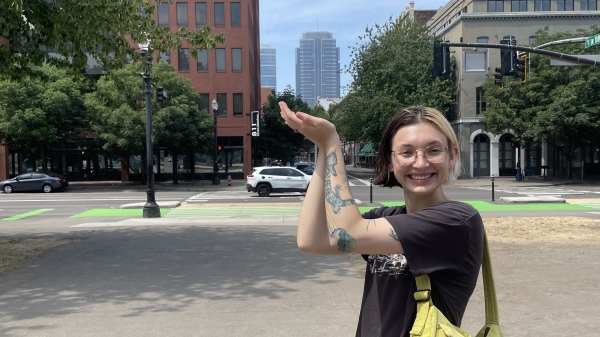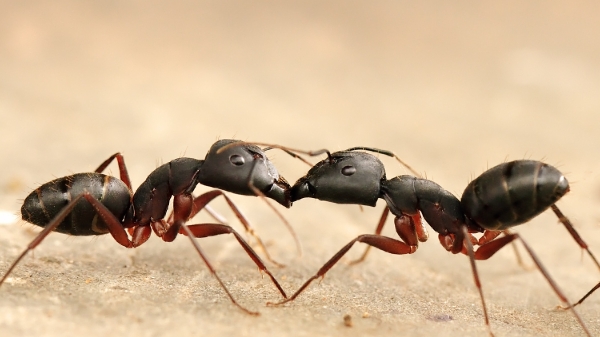From the Air Force to ASU: First-generation student named Dean’s Medalist

“I’ve learned the value of hard work, time management and leaning on my support system, especially my leadership in the Air Force, whose guidance and encouragement have been invaluable throughout my academic journey,” says Mariah Gonzales, graduating this month with a bachelor's degree in geographic information science.
Mariah Gonzales, a first-generation college student and full-time Air Force service member, showed the power of determination during her time at Arizona State University.
This December, the Buda, Texas, resident will graduate with a bachelor’s degree in geographic information science from ASU’s School of Geographical Sciences and Urban Planning, where she will be honored as the Dean’s Medalist. Throughout her academic experience with ASU Online, Gonzales has been supported by the ASU Military Active Duty and Reservist Commitment Scholarship and the EdAssist Bright Horizons Scholarship.
Gonzales' path to success began at a community college, where she completed her general education before transferring to ASU as an online student. Balancing academics with full-time military service and two internships, she credits her Air Force experiences for strengthening her determination.
“My journey has been blended by perseverance, dedication and the support of those around me,” Gonzales says.
“I’ve learned the value of hard work, time management and leaning on my support system, especially my leadership in the Air Force, whose guidance and encouragement have been invaluable throughout my academic journey.”
As a college student fulfilling her military obligations, Gonzales faced challenges of being away from her family for extended periods, missing holidays and special occasions. Despite these sacrifices, she remained focused on her goal of earning a degree and setting an example for her family.
“I’m not only building a better future for myself; I’m also paving the way for my family as the first in my generation to earn a college degree,” she says.
We caught up with Gonzales to discuss her time at ASU, her advice for current students and plans for the future.
Question: Why did you choose ASU?
Answer: I needed a school that could keep up with my life in the Air Force. As a reservist, I volunteered for active-duty orders and have been actively serving for the past two years. It’s a commitment I wouldn’t change for anything. ASU has provided the flexibility and support I needed to balance my service with my education. Their dedication to active-duty and veteran students makes me feel understood and supported. I couldn’t ask for a better university to help me pursue my goals.
Q: What was your “aha” moment when you realized you wanted to study the field you majored in?
A: I knew geographic information science (GIS) was the right path for me when I realized how powerful maps are in telling stories and solving complex problems. I’ve always been fascinated by how geography shapes our world, but it wasn’t until I discovered GIS that I understood how technology could transform that curiosity into something practical. The ability to analyze data and visualize patterns to solve real-world challenges resonated with me. Whether it’s tracking environmental changes, understanding urban growth or helping communities prepare for natural disasters, GIS has endless possibilities, and I felt driven to be part of that.
Q: What’s something you learned while at ASU that surprised you or changed your perspective?
A: At ASU, I learned how different perspectives and disciplines can work together to solve complex problems. It surprised me to see how people from fields like business, history, engineering and public health each brought unique insights. I learned that no single field has all the answers, and the best solutions often come from collaborating with others who approach problems differently. This shift in perspective taught me the value of looking beyond my own field and being open to new ideas.
Q: Which professor taught you the most important lesson while at ASU?
A: Every professor I encountered at ASU played a key role in my success. Each taught me valuable skills — whether technical, problem-solving or deepening my understanding of GIS — that contributed to my growth and degree completion. Their collective guidance has shaped me into the student I am today, and I’m grateful for the support and wisdom they’ve shared.
Q: What’s the best piece of advice you’d give to those still in school?
A: My best piece of advice is to always ask questions and take advantage of office hours. When I struggled with an assignment, I made it a point to reach out to the TA or professor. They were always more than happy to assist, and that extra support made a big difference. Remember, you’re not alone — help is available. And don’t forget to take time for yourself. Self-care is just as important as coursework, so make sure you recharge when needed.
Q: What was your favorite spot for power studying?
A: Although I couldn’t study on campus due to my service, my favorite place to work was at my desk. It became my dedicated space for focusing, studying and diving into my work. While it wasn’t on campus, it was where I found my rhythm and could fully dedicate myself to my education.
Q: What are your plans after graduation?
A: I’m excited to continue my education by starting the Master of Science in program evaluation and data analytics next spring. This new step aligns perfectly with my GIS degree, as both involve analyzing data to drive informed decisions and create meaningful change. GIS has shown me the importance of spatial data in solving real-world problems, and the new program will allow me to expand those skills in evaluating programs and policies, ultimately helping me make a greater impact.
Q: If someone gave you $40 million to solve one problem on our planet, what would you tackle?
A: I would focus on improving infrastructure, specifically public transportation, in underserved areas. Better infrastructure is critical to thriving communities, and enhancing transportation would increase access to jobs, health care and education. Reliable public transport would create a positive cycle, leading to more opportunities and healthier, more stable communities. It’s an investment that pays off in many ways, far beyond just the infrastructure itself.
More Sun Devil community

ASU Online grad finds balance with Starbucks College Achievement Plan
Lynae Carlin is living proof that if at first you don’t succeed, try again.The Arizona native explored several career paths in search of the perfect fit, dabbling in medical assisting before pursuing…

Army veteran dedicates PhD to exploring the social order of ant colonies
While Colin Lynch was enlisted as a medic in the National Guard, he had a pastime that was quite different from that of his peers: He also volunteered as a researcher in a social insect lab at the…
College of Health Solutions grad, soccer star hopes to make the big leagues
A staple lineup defender on the Sun Devil women’s soccer team, Lauren Kirberg is looking to join the National Women’s Soccer League (NWSL) after graduating from the College of Health Solutions…